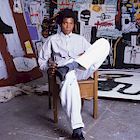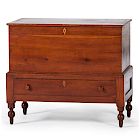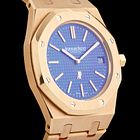Timeless Modernism: Willy Guhl at Circa Auction
Few designers capture the enduring appeal of mid-century modernism like Willy Guhl (1915–2004). Long before concrete furniture became a design-world staple, the Swiss innovator was experimenting with industrial materials and sculptural forms that blurred the line between functional object and work of art.
Born in Stein am Rhein, Guhl trained as a carpenter before studying at the Zurich School of Applied Arts, where he later taught for nearly 40 years. A leader of the Swiss neo-functional movement, Guhl believed in “achieving the most with the minimum of effort.” His work embodies that philosophy: bold yet restrained, practical yet poetic.
Industrial Materials, Organic Forms
Guhl’s designs often relied on Eternit, a then-revolutionary mixture of cement and asbestos developed by the Belgian company Etex. Commissioned in the 1950s to design planters with his students, Guhl pioneered forms that were simple, strong, and distinctly modern. The resulting works, from flowing seating to iconic sculptural vessels, remain highly collectible today.
His most recognizable design, the Loop Chair (introduced in 1954), epitomizes his approach: a single band of Eternit curved into a sinuous, ergonomic seat that feels as fresh today as it did seven decades ago. Equally notable are his garden planters, tambour-like “Diabolo” vessels, and even whimsical designs like a doghouse crafted from fiber cement.

Willy Guhl at his Hemishofen, Switzerland, home. Photo: Courtesy of Swisspearl
Highlights at Circa Auction
Collectors will have the opportunity to acquire important examples of Guhl’s work in Circa Auction’s upcoming sale A Modernism Summer, with several standout lots:
Pair of Loop Chairs, 1960s (Lot 287)

Estimate: $10,000–$15,000
Guhl’s most iconic creation, the Loop Chair, remains a benchmark of mid-century design. This pair exemplifies his mastery of industrial materials shaped into organic, human-centered forms.
Pair of Pod Chairs, 1960s (Lot 286)
.png)
Estimate: $10,000–$15,000
These sculptural Pod Chairs showcase Guhl’s continued exploration of curved, enveloping seating; minimalist yet inviting.
Dog House in Fiber Cement, 1960s (Lot 111)
.png)
Estimate: $2,000–$3,000
A rare example of Guhl’s playful side, this piece demonstrates how he applied modernist principles to everyday living, even for pets.
Pair of Fatboy Diabolo Planters, Switzerland, 1960s (Lot 87)
.png)
Estimate: $2,000–$3,000
Guhl’s Diabolo planters, instantly recognizable for their hourglass form, have become staples of mid-century garden design. This oversized pair offers both functionality and sculptural presence.
Lasting Influence
Guhl’s work continues to inspire today’s designers and collectors alike. His philosophy of people-centered design, paired with his bold material experimentation, paved the way for much of what we now take for granted in contemporary furniture and outdoor living. From garden terraces to gallery floors, his creations retain their timeless appeal.
Explore these lots and the full catalog of Circa Auction’s upcoming sale on Bidsquare.com.
.
- A Brief History of Paper Dolls (and Why We Still Love Them)
- Artist Spotlight: Emile Pierre Branchard
- The Delphos Gown: Mariano Fortuny’s Timeless Revolution in Fashion
- Artist Spotlight: Charles Cary Rumsey, Artist & Athlete
- Reflections Through Time: A Brief History of Mirrors in the Home
- From the Gridiron to the Gallery: Super Bowl Inspired Finds on Bidsquare
- Miriam Haskell: The Legacy of an Iconic Costume Jewelry Designer
- Bidsquare’s Valentine’s Day Gift Guide for Art Lovers & Collectors
- Artist Spotlight: William Edmondson, A Soulful Voice in American Sculpture
- HOPLA Presents: Raymour vs. Flanigan A Speculative Anthropological Exhibition Staged for One Night Only



 EUR
EUR CAD
CAD AUD
AUD GBP
GBP MXN
MXN HKD
HKD CNY
CNY MYR
MYR SEK
SEK SGD
SGD CHF
CHF THB
THB












